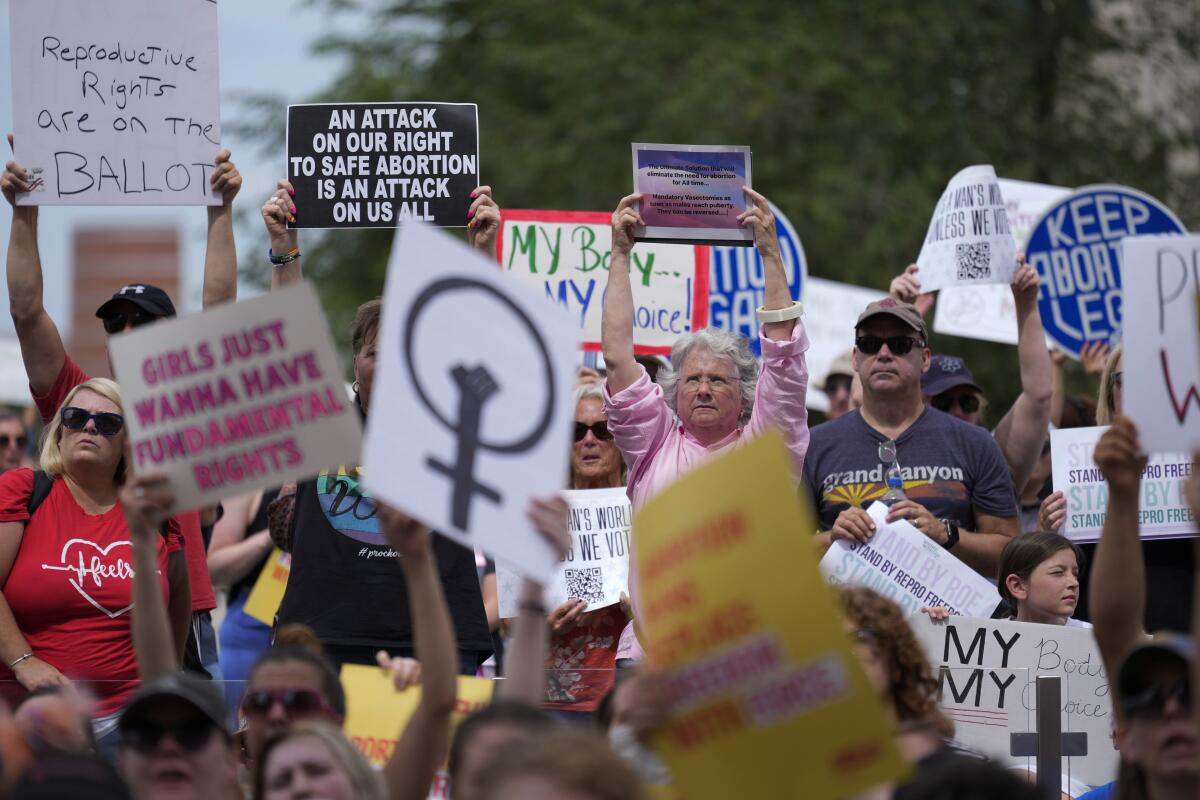Newsletter: Essential Politics: On the GOP’s response to the rape of a 10-year-old girl

WASHINGTON — When the U.S. Supreme Court last month revoked the constitutional right to access abortion, I assumed that the decision’s most serious consequences would not become evident for some time.
As a journalist, I’ve learned that it often takes years to see and understand the repercussions of choices made by powerful people in Washington. So I figured it would take a while for us to fully understand how Dobbs vs. Jackson Women’s Health Organization, and the uneven web of abortion laws around the country the decision produced, would affect ordinary people.
For the record:
1:25 p.m. July 20, 2022An earlier version of this newsletter said Roe vs. Wade was decided in 1978. It was decided in 1973.
I was wrong.
A story of a 10-year-old girl being forced to cross state lines to terminate a pregnancy very quickly showcased the ramifications of the decision made by the high court’s conservative majority. It also showed how proponents and opponents of the medical procedure may react to similar cases in the future.
Hello, I’m Erin B. Logan, a reporter with the L.A. Times. I cover the Biden-Harris administration. Today, we will talk about the law, child rape and the antiabortion movement’s response to the real-life consequences of once-theoretical strict abortion bans.
Get our L.A. Times Politics newsletter
The latest news, analysis and insights from our politics team.
You may occasionally receive promotional content from the Los Angeles Times.
What happened in the Midwest
Earlier this month, an Indiana newspaper reported that a 10-year-old patient in Ohio had visited an Indianapolis obstetrician-gynecologist, Dr. Caitlin Bernard, to terminate a pregnancy. The child’s home state bans abortion after fetal cardiac activity is detected, which is generally around six weeks, and includes no exceptions for victims of incest or rape. The extreme measures taken by the girl and her family to obtain an abortion were touted by prochoice activists as the consequences of the overturning of Roe vs. Wade, the 1973 case that protected access to the medical procedure.
The story caught the attention of many in Washington, including President Biden, who decried the incident, saying he could not “think of anything more extreme” than forcing a 10-year-old to give “birth to a rapist’s child.”
Right-wing opinion leaders cast doubt on the story, which the Indiana paper initially attributed solely to Bernard. The story “is not true,” Fox News host Tucker Carlson told his viewers. The account was “fanciful” and “unlikely,” the Wall Street Journal’s editorial board wrote. “The idea that you would have politicians in America try to exploit a story like this and make up a story like this in order to advance their own sick agenda tells you they are not serious about the issue,” said Charlie Hurt, a Fox News analyst and columnist for the Washington Times.
Last Wednesday, though, police arrested a 27-year-old man who reportedly admitted to raping the girl at least twice.

After it was abundantly clear that the 10-year-old existed and had obtained an abortion, Indiana Atty. Gen. Todd Rokita said his office would investigate whether Bernard violated the law by failing to report the procedure. In a television interview, Rokita called Bernard an “abortion activist” and said she had a “history of failing to report.” Multiple news outlets have confirmed that Bernard reported the procedure under Indiana requirements. Kathleen DeLaney, Bernard’s attorney, said in a statement that her client “took every appropriate and proper action in accordance with the law.”
Lauren Robel, former dean of Indiana University’s law school, on Friday filed a complaint against Rokita, writing that he “made inflammatory statements on national television, without due diligence concerning their truthfulness, designed to harass and intimidate” Bernard, according to a copy provided to The Times. “He knew or should have known that by [making the statements], he would imperil Dr. Bernard’s safety,” Robel wrote.
In a statement, Kelly Stevenson, Rokita’s press secretary, said, “Any attorney or client can file anything they want, even without basis, which is the case here.” Stevenson added that the investigation into Bernard is ongoing and that “no enforcement actions have been filed. “
On Tuesday, DeLaney filed a civil claim against Rokita, the first step in a potential defamation lawsuit.
In another statement, Stevenson said the claim “is part of a divisive narrative and an attempt to distract from the important work of the office, including the duty to determine whether practitioners have violated the standards of practice in his or her profession, as well as federal and state laws.”
Our daily news podcast
If you’re a fan of this newsletter, you’ll love our daily podcast “The Times,” hosted every weekday by columnist Gustavo Arellano, along with reporters from across our newsroom. Go beyond the headlines. Download and listen on our App, subscribe on Apple Podcasts and follow on Spotify.
The backlash
The episode is evidence that the Supreme Court has dramatically altered America’s abortion politics.
The “antiabortion side became the defenders all of a sudden and are having to justify the laws that they have or are working to put into place in ways that they hadn’t previously needed to,” Kate Hunt, a lecturer of international studies at Indiana University Bloomington, said.
“They spent a long time just pointing to the fetus,” she said. “But then what happens when you get faced almost immediately with this very hard case of — if you want to use their terminology — two babies whose lives are being kind of pitted against one another because of this horrendous violation of this little girl’s bodily autonomy.”
Opponents of overturning Roe are asking the leaders championing the new laws how they will handle the “crisis” they’ve created, Hunt said. “A lot of times, what those in power will do, especially if they don’t know exactly how to handle the crisis, is to deny it.”
Strict post-Roe abortion bans are no longer the goals of the antiabortion movement. These laws are reality, and the politicians who advocated for them will have to figure out how to justify them to voters.
Enjoying this newsletter? Consider subscribing to the Los Angeles Times
Your support helps us deliver the news that matters most. Become a subscriber.
The view from the fight for abortion rights
— The health plan for members of one of Hollywood’s most powerful unions, the Directors Guild of America, has expanded coverage for abortion services to include dependents and travel benefits, Times writer Anousha Sakoui reported. The Board of Trustees of the Directors Guild of America-Producer Pension and Health Plans, which provides benefits for the almost 19,000 union directors and directorial team members, unanimously approved amendments that would allow children of union members to be covered for abortion care and travel costs for those working in states where the treatment is no longer legal.
— Following the decision in Dobbs vs. Jackson Women’s Health Organization, more people have sought out sterilization, according to obstetrician-gynecologists who have seen an uptick in Arizona, North Carolina, Texas and Florida, Times writer Melissa Gomez reported. Many women said that opting for sterilization was their way of retaining control at a time when they feared lawmakers would continue to chip away at reproductive rights, including contraceptives and sterilization.
— Many OB-GYNs, including some who perform abortions, are celebrating a decision that allows them to avoid traveling to Texas for certifying board exams, the Associated Press reported. The American Board of Obstetrics and Gynecology, which is based in Dallas, held virtual exams during the pandemic but planned to have the fall oral exams in person. In a reversal last week, it made the exams virtual. Some OB-GYNs feared that gathering en masse would make them vulnerable to violence. The board exams are voluntary, but certification lends respect to doctors’ credentials, indicating that they graduated from an accredited medical school and passed written and oral competency exams. Some employers require the tests.
The view from Washington
— The House on Tuesday voted to protect same-sex and interracial marriages, in a response to the Supreme Court’s overturning of Roe vs. Wade, which has sparked concerns that other rights might be in jeopardy, the Associated Press reported. The House vote is also part of a political strategy to set up an election-year roll call that will force all lawmakers, Republicans and Democrats, to go on the record with their views on the high-profile social issue. The bill is almost certain to stall in the Senate, where most Republicans would surely oppose it.
— The House committee investigating the Capitol riot has subpoenaed the Secret Service for text messages that were reportedly deleted by agents around Jan. 6, 2021, as the panel probes Trump’s actions at the time of the deadly siege, the Associated Press reported. The subpoenas came hours after the nine-member panel received a closed briefing from the watchdog for the Department of Homeland Security, which oversees the Secret Service.
— Biden on Friday endorsed an independent Palestinian state, although he conceded that such a historic development was “far away,” Times writers Noah Bierman and Tracy Wilkinson reported. Many Palestinians are irked that Biden has not reversed Trump-era actions, including the former president’s declaration that Jerusalem is the capital of Israel. That was a controversial decision because Palestinians claim part of the contested holy city as the capital of an eventual state. They are also angry that Israeli settlers have been steadily claiming land that would complicate their ability to govern an eventual independent nation.
The view from the campaign trail
— A coalition of conservative candidates and officeholders who describe themselves as “America First” promote the falsehood that Biden did not win the 2020 presidential election, the Associated Press reported. The idea has seeped deeply into this year’s Republican primaries, and many GOP candidates are running on platforms that deny Trump’s defeat two years ago. As some of those candidates lose their own races, they are reaching new frontiers in election denial by insisting that those primaries also were rigged.
— Rep. Karen Bass has rescinded her endorsement for city attorney candidate Faisal Gill, who is known for his progressive criminal justice reform policies. Bass, who is running for Los Angeles mayor, has had to walk a delicate line on issues of policing and public safety. Her opponent, billionaire developer Rick Caruso, has fought to cast her as insufficiently tough on crime, while her party’s leftmost flank has attacked some of her more moderate stances. Bass disavowed Gill’s controversial proposal to institute a 100-day moratorium on the prosecution of most new misdemeanor charges.
— Democrats are on defense across the country in this year’s midterm elections but appear to believe some of their best chances for flipping GOP congressional districts are in California, Times writer Seema Mehta reported. Five of six candidates the Democratic Party added to its “Red to Blue” program on Monday are in this state. Candidates must show viability by hitting fundraising goals as well as having robust campaigns and field operations to qualify for the program, which provides fundraising, organizing and other support.
Sign up for our California Politics newsletter to get the best of The Times’ state politics reporting. And don’t forget to follow me on Twitter for updates about my iconic dog Kacey and to share pictures of your adorable furbabies with me at erin.logan@latimes.com.
Stay in touch
Keep up with breaking news on our Politics page. And are you following us on Twitter at @latimespolitics?
Did someone forward you this? Sign up here to get Essential Politics in your inbox.
Until next time, send your comments, suggestions and news tips to politics@latimes.com.
Get the L.A. Times Politics newsletter
Deeply reported insights into legislation, politics and policy from Sacramento, Washington and beyond. In your inbox three times per week.
You may occasionally receive promotional content from the Los Angeles Times.




